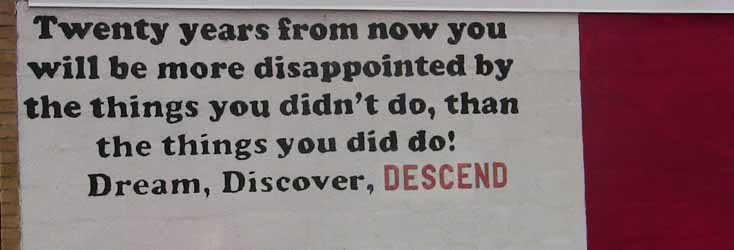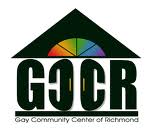home I blog I photography I video I contact
Thriving in conservative times.
by Alix Bryan
Two Richmond nonprofits rely on unique approaches to advance their missions, amid a recession that greatly strains available resources. Not only do they face conservative economic times, they face the challenge of bringing a message of diversity to a conservative state. Without their efforts, the LGBT community would be less visible, and the public less informed.
Colorful building stands out, provides services
Jay Squires, executive director of the Gay Community Center of Richmond, has been involved in LGBT ( Lesbian, Gay, Bi-sexual, and Transgender) nonprofit work since the 1980s. The GCCR is Virginia's first and only gay community center. Squires has witnessed the transition as Richmond becomes a safer, more accepting place for the once closeted LGBT community.
"Our community is more visible and much more engaged, as a community and in the community at large, which has allowed us to make a great deal of political and social progress," said Squires.
The GCCR can't help but be visible. It is easily spotted from Interstate 95, a mammoth building painted in vibrant, rainbow colors. On Tuesday and Thursday, vehicles spill out onto the side streets from the large parking lot. Thousands of people file in the door weekly to spend hours playing bingo. Numerous other events, and the Diversity Thrift store, keep the GCCR active and raise funds. Since 1999, Diversity Thrift has donated more than half a million dollars (figure was $562,164 in Jan. 2009) to local groups with programs that benefit the LGBT community. Last year, the General Assembly recognized the GCCR for its community efforts in funding local organizations.
Helping youth be themselves
The Richmond Organization for Sexual Minority Youth is 18 years old and ushering in a new epoch as they enter adulthood. John Dougherty, at age 32, has held the executive director position at ROSMY for three years. Dougherty sits cheerfully at his desk, enthusiastic about just receiving a call from Sun Trust saying that they want to be financially involved with his organization. Chances are that he is spirited for many reasons.
“It’s very exciting to finally be in the spot where people are saying we are an organization to get behind and they want their name attached to it,” said Dougherty.
Dougherty is not exaggerating. In the past month he has received an award trifecta. Dougherty was recently profiled by Style Weekly in its "Top 40, Under 40" awards. He accepted, on behalf of ROSMY, the Richmond History Makers award from the Valentine Richmond History Center, and the Richmond Peacemaker Award for 2009 from theRichmond Peace Education Center.
Under Dougherty's leadership, ROSMY developed the Institute of Equality, with intention to educate the entire social service system in Virginia how to assess and respond to the needs of LGBT youth, within their service setting. The Institute offers nationally accredited training, and last year over 400 youth and family service providers attended. ROSMY is waiting confirmation on a contract with the Department of Juvenile Justice that will commit the DJJ to eight annual trainings at the Institute, with 30 slots in each session.
"For the most part, we get 100 percent fantastic reviews because they have never had this discussion before, never thought about all the different issues before," said Dougherty.
ROSMY's ongoing programs include support and leadership services for youth. ROSMY provides a 24/7 hot-line for youth in crisis. For the first time in state history, ROSMY, in partnership with the Virginia Home for Boys and Girls, can provide emergency shelter for kids 18 and up. Truancy runs high among LGBT youth because it is often too traumatic for them to go to school, they get bullied and harassed.
Struggling to stay ahead of the curve in a recession
Both Squires and Dougherty wish they had access to programs like theirs when they were growing up. They each incorporate innovative fundraising strategies to ensure that they can continue to provide vital resources for the LGBT community. The success of each organization goes beyond their effective programs. ROSMY and the GCCR maximize resources by relying heavily on volunteers, to keeps operation and service costs low. The GCCR asks the community for just five volunteer hours a month, and like ROSMY, banks at least 3,000 volunteer hours annually.
"The passion of people who want to see this community thrive helps sustain us," said Dougherty.
Still, the recession impacted both organizations. Donations to Diversity Thrift store slowed the past year, even though this is beginning to turn around. People don't donate clothes and furniture if they can not afford any in replacement. Bingo attendance was less affected, good news with the games bringing in close to $400,000 revenue annually.
"Like every other nonprofit in the country, this recession has been challenging." said Squires.
ROSMY was down 23 percent at the end of their first quarter, although a recent campaign successfully raised $100,000, half of it a match grant from the local Mary Morton Parsons Foundation.
In what is one of many of ROSMY's progressive strategies, Dougherty recently brainstormed what he calls, "a nonevent event". The event starts in January and serves the dual purpose of community outreach, while funding marketing costs. Dougherty is leaving behind the traditional banquet dinner, where $10,000 is spent to raise $20,000.
Instead, he is utilizing corporate and individual sponsorships to publish ads in Style Weekly, as well as The Hook, a Charlottesville weekly magazine. The ads are essentially public service announcements. Dougherty is confident that it will be easier to sell corporate sponsorships since the circulation of each weekly magazine is greater than that of an event program just seen by 200 people. This is the second major fundraising campaign for ROSMY that is low budget and will be done primarily without printed materials.
Keeping the conversation going
"My biggest fear is that we can't get the community prepared enough for what the consequences of this becoming a public conversation are, at the level it is quickly becoming a public conversation," said Dougherty.
Dougherty thinks that Virginia is not on par with the national dialogue about gay topics like same-sex partnerships, human sexuality, and safe-sex practices.
"Things in Virginia are changing and they are changing quickly," said Dougherty.
The commitment of both the GCCR and ROSMY has initiated a community awareness that was absent just five years ago.
"We are here, and we are here to stay," said Squires.



